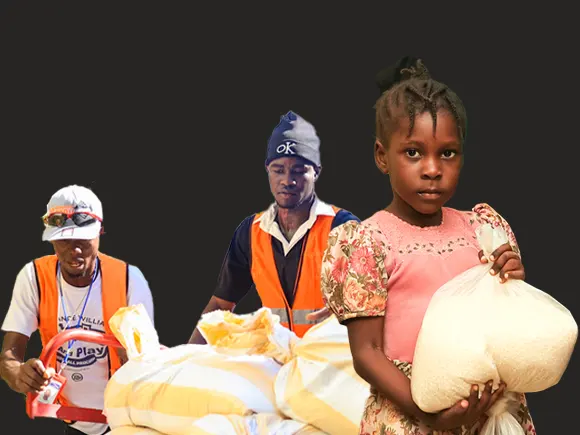Coronavirus: Women in Guatemala Sew Masks for Hospitals in N.Y.
COCONUT CREEK, Fla. (May 19, 2020) Indigenous Guatemalan women are using sewing skills gained through a partnership with Food For The Poor to sew masks for U.S. healthcare workers on the frontlines of the coronavirus pandemic.
Factories in Guatemala have been closed due to the government lockdown to prevent the spread of COVID-19, the respiratory disease caused by coronavirus.
But Food For The Poor’s partnership with Brooklyn, N.Y.-based Mercado Global and Caritas has allowed the indigenous women to stay safe at home while they still work and earn an income.
Like many developing countries in the Caribbean and Latin America, Guatemala is facing food shortages and price increases on basic necessities.
Thanks to Food For The Poor’s generous donors, Caritas has distributed 15,000 pounds of food to these women and their families, while Mercado Global has continued to drop off materials and pick up finished masks.
“We have been giving masks to all of our artisans and their families, and doing lots of trainings on hygiene for artisans to help them understand how to stay safe from the virus,” said Ruth DeGolia, Executive Director of Mercado Global. “The food shipment from Food For The Poor was so greatly appreciated by the artisans and was so important due to the travel restrictions now in place.”
Mercado Global has shipped 8,000 masks to hospitals in New York City and 4,500 to hospitals in Ohio. Through mid-June, it plans to ship another 8,000 masks to hospitals in Ohio, California, Massachusetts and Vermont, plus 19,000 to New York City postal service workers and housing authority workers, 10,000 to nonprofits serving HIV and immunocompromised populations and 2,500 to migrant farm workers in California.
One mask, with an interchangeable filter and metal nose guard, is designed for healthcare workers who are not intubating or performing surgeries. The other is a simpler version that’s being sold to consumers online and wholesale to boutiques and corporate partners.
“Everyone loves them. They are beautiful and so well made,” said Joni Barrow, Chief Cardiovascular Physician Assistant at NewYork-Presbyterian/Weill Cornell Medical Center. “We are thrilled that while we are being supported as physician assistants fighting COVID-19, that the artisans making the masks continue to be supported as well.”
For every mask purchased, another is donated to those working on the frontlines of the coronavirus pandemic. In addition to the masks donated to hospitals, several companies have ordered masks from the artisans for their own essential staff.
In the early stages of the pandemic, Mercado Global worked closely with the women to quickly shift from producing fashion accessories to protective masks that are compliant with the Food and Drug Administration. The company has relied on cell phone videos to train workers, while bringing one artisan from each community to its offices in Guatemala for more intensive training. Those women return to train their fellow co-op members.
“All of this, including the cost of transporting artisans safely to our offices in private transportation, has been funded by Food For The Poor,” DeGolia said.
The same training has been shared with artisans in Honduras and Trinidad where women are learning how to make masks safely for local hospitals and for sale to the general population.
“This program has empowered these women and given them the opportunity to make their own living and take care of their families,” said Angel Aloma, Food For The Poor EVP and Chief Marketing Officer. “It’s truly remarkable and a testament to their spirit how they have been able to adapt to the reality of the coronavirus pandemic to not only continue working, but to protect first responders thousands of miles away in the United States. We’re extremely grateful to our donors for providing food that is allowing the women to stay safe in their homes.”
Mercado Global’s partnership with Food For The Poor began with a donor from Virginia. Their generous gift provided the training and equipment to women in Sololá, Guatemala, to make handbags and other items on a scale that can compete in the international marketplace, using Mercado Global’s unique designs.
The women have the potential to earn up to $8 a day, working part-time. This allows them to make up to three times the daily rural Guatemalan income and lift themselves out of poverty in a short time.
While the coronavirus pandemic dealt an unexpected challenge, the women have risen to the occasion.
“With the help of Food For The Poor, we’ve built a nimble and adaptable nonprofit that is equipped to face these challenges,” DeGolia said. “Thank you for your support as we begin our journey with unknown challenges, where the only certainty is our commitment to supporting those who need us most.”
Food For The Poor, one of the largest international relief and development organizations in the nation, does much more than feed millions of the hungry poor primarily in 17 countries of the Caribbean and Latin America. This interdenominational Christian ministry provides emergency relief assistance, clean water, medicine, educational materials, homes, support for orphaned and abandoned children, care for the aged, skills training and micro-enterprise development assistance. For more information, please visit www.FoodForThePoor.org.
Michael Turnbell
Public Relations
954-427-2222 x 6054
michaelt@foodforthepoor.com
